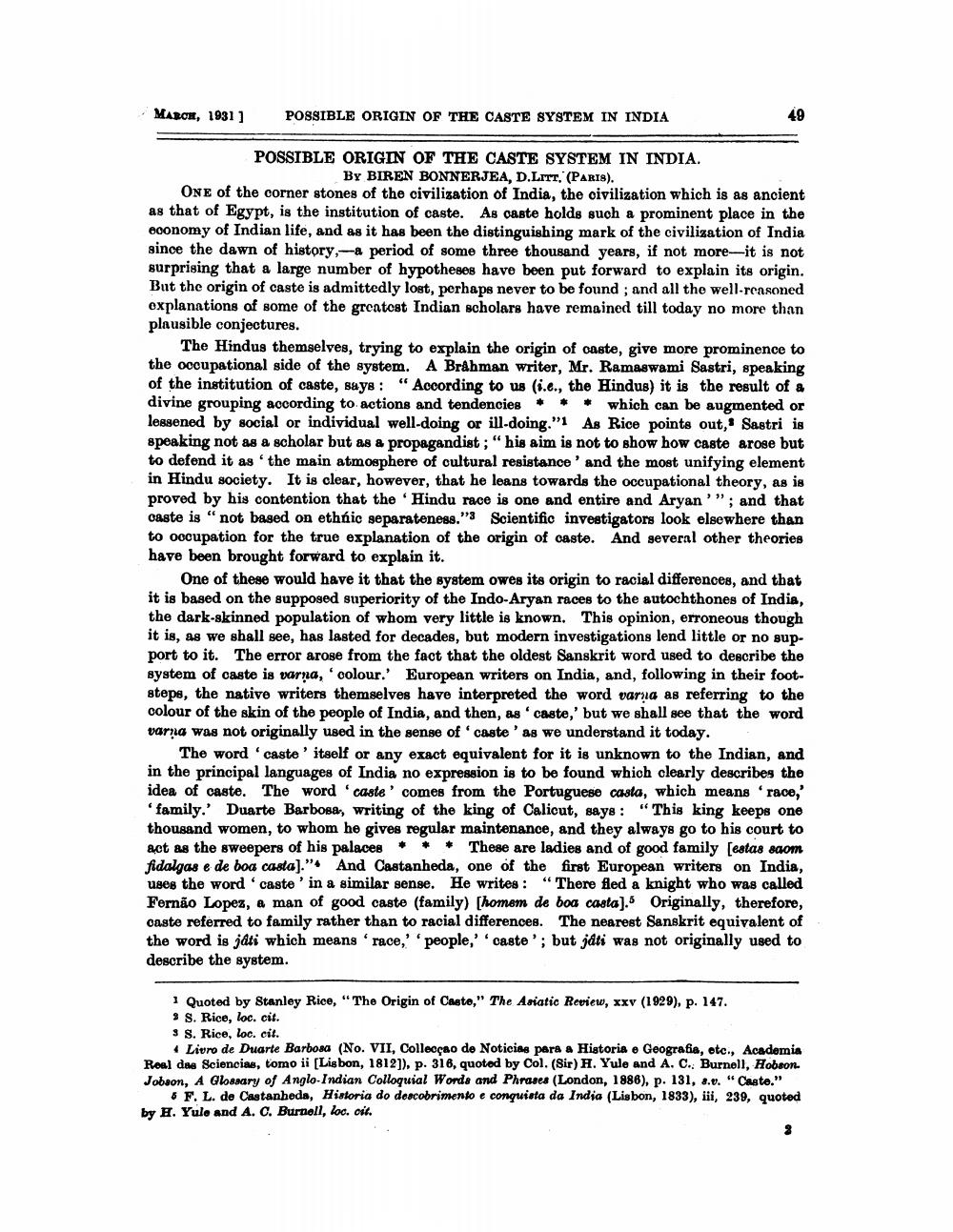________________
MABOH, 1931]
POSSIBLE ORIGIN OF THE CASTE SYSTEM IN INDIA
POSSIBLE ORIGIN OF THE CASTE SYSTEM IN INDIA.
BY BIREN BONNERJEA, D.LITT, (PARIS). ONE of the corner stones of the civilization of India, the civilization which is as ancient as that of Egypt, is the institution of caste. As oaste holds such a prominent place in the economy of Indian life, and as it has been the distinguishing mark of the civilization of India since the dawn of history, a period of some three thousand years, if not more-it is not surprising that a large number of hypotheses have been put forward to explain its origin. But the origin of caste is admittedly lost, perhaps never to be found ; and all the well-reasoned explanations of some of the greatest Indian scholars have remained till today no more than plausible conjectures.
The Hindus themselves, trying to explain the origin of caste, give more prominence to the occupational side of the system. A Brahman writer, Mr. Ramaswami Sastri, speaking of the institution of caste, says: "According to us (i.e., the Hindus) it is the result of a divine grouping according to actions and tendencies + + + which can be augmented or lessened by social or individual well-doing or ill-doing."1 As Rice points out,. Sastri is speaking not as a scholar but as a propagandist ; "his aim is not to show how caste arose but to defend it as the main atmosphere of cultural resistance and the most unifying element in Hindu society. It is clear, however, that he leans towards the occupational theory, as is proved by his contention that the Hindu race is one and entire and Aryan'"; and that caste is "not based on ethnic separateness." Scientific investigators look elsewhere than to oocupation for the true explanation of the origin of caste. And several other theories have been brought forward to explain it.
One of these would have it that the system owes its origin to racial differences, and that it is based on the supposed superiority of the Indo-Aryan races to the autochthones of India, the dark-skinned population of whom very little is known. This opinion, erroneous though it is, as we shall see, has lasted for decades, but modern investigations lend little or no support to it. The error arose from the fact that the oldest Sanskrit word used to describe the system of caste is varna, colour.' European writers on India, and, following in their footsteps, the native writers themselves have interpreted the word vara as referring to the colour of the skin of the people of India, and then, as' caste,' but we shall see that the word varna was not originally used in the sense of caste' as we understand it today.
The word 'caste' itself or any exact equivalent for it is unknown to the Indian, and in the principal languages of India no expression is to be found which clearly describes the idea of caste. The word 'caste' comes from the Portuguese casta, which means 'race, 'family.' Duarte Barbosa, writing of the king of Calicut, says: “This king keeps one thousand women, to whom he gives regular maintenance, and they always go to his court to act as the sweepers of his palaces * * * These are ladies and of good family [estas saom fidalgas e de boa casta)." And Castanheda, one of the first European writers on India, uses the word 'caste' in a similar sense. He writes: "There fled a knight who was called Fernão Lopez, a man of good caste (family) [homem de boa casta). Originally, therefore, caste referred to family rather than to racial differences. The nearest Sanskrit equivalent of the word is jati which means 'race, people,''caste'; but játi was not originally used to describe the system.
i Quoted by Stanley Rice, "The Origin of Caste," The Asiatic Review, xxv (1929), p. 147.
S. Rice, loc. cit. 3 S. Rice, loc. cit.
4 Livro de Duarte Barbosa (No. VII, Colleoçao de Noticias para a Historia e Geografia, etc.. Academia Real des Sciencias, tomo ii (Lisbon, 1812]), p. 316, quoted by Col. (Sir) H. Yule and A. C.. Burnell, Hobson. Jobeon. A Glossary of Anglo-Indian Colloquial Words and Phrases (London, 1886), p. 131, a.v. "Caste."
F. L. de Castanheda, Historia do descobrimento e conquista da India (Lisbon, 1833), iii, 239. quoted by H. Yule and A. C. Burnell, loc. cit.




